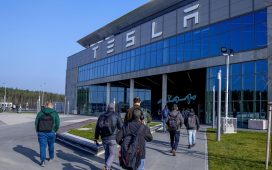Pilot training schools in the UK are actively looking for instructors who can teach on electric-powered aeroplanes, as the surging price of fuel gives a boost to the country’s emerging zero-emissions market.
The global electric aviation industry remains in its infancy, with the Slovenian-made Pipistrel Velis Electro, a two-seater training aircraft powered by lithium-ion batteries, only certified in the UK last year.
But Deepak Mahajan, who runs a training centre and is director at the UK and Ireland distributor for Pipistrel, Fly About Aviation, said his school and three others were recruiting instructors to meet the demand for more sustainable and cheaper training.
Mahajan says seven Velis Electros are currently flying in the UK, with an eighth arriving soon. His school at Damyns Hall Aerodrome, Essex, was the first in the country to offer the full private pilot’s licence on electric planes. The RAF also has them as trainers, he said.
Pipistrel says its 57.6kW liquid-cooled electric engine has significant advantages over the combustion equivalent, which include lower operating costs and being much quieter – a major issue for flying schools based near residential areas.
The aircraft battery takes about 90 minutes to charge and lasts about an hour, making it useful for most lessons but not ideal for cross-country flights.
Mahajan hopes to change this by encouraging aerodromes to buy electric chargers. Ten airports have already installed them, with at least one powered by solar panels, further decreasing the impact on the climate. “We’re slowly building up that network of chargers across the country,” he said.
Still, the most significant draw to flying schools could be financial. The Velis Electro costs roughly the same price as Pipistrel’s similar gasoline-fuelled plane at about £170,000, but rocketing fuel prices mean the hourly running cost is far lower.
“My electric aircraft costs £3 per hour,” said Mahajan. “The sister [fuel-powered] aircraft is £30 an hour.”
Initially, the price for the student will be several times higher than that at about £200 an hour as the schools will need to pay off the cost of the aircraft purchase.
Many airfields use fleets of planes that are decades old and have had several owners so they can reduce their costs. In most cases, electric aircraft have to be bought new from the factory, meaning it could take time before flying schools can significantly reduce their prices.
“Most schools have old tin cans whereas a new plane is like a new car – you have to shell out a lot of money upfront,” said Mahajan. “But the maintenance is almost zero.”








